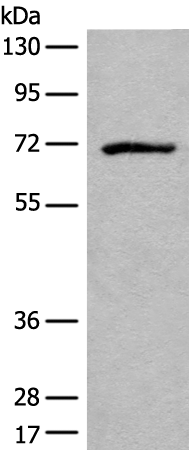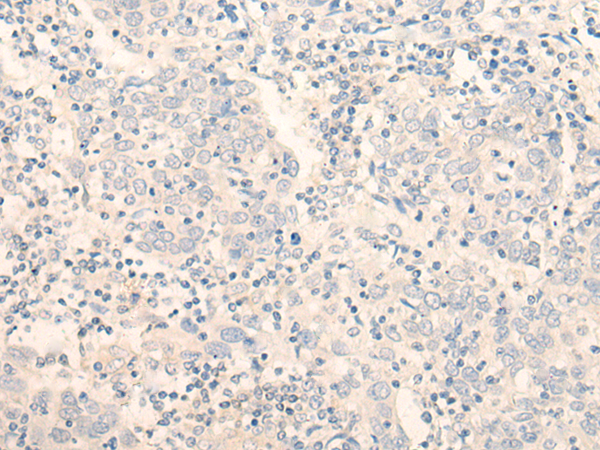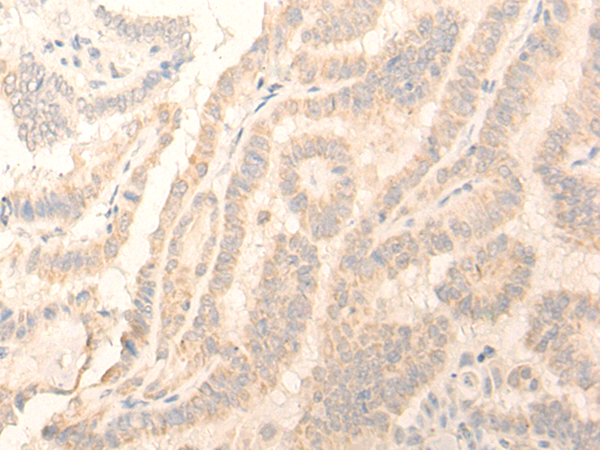


| WB | 咨询技术 | Human,Mouse,Rat |
| IF | 咨询技术 | Human,Mouse,Rat |
| IHC | 1/40-1/200 | Human,Mouse,Rat |
| ICC | 技术咨询 | Human,Mouse,Rat |
| FCM | 咨询技术 | Human,Mouse,Rat |
| Elisa | 1/5000-1/10000 | Human,Mouse,Rat |
| Aliases | EMR3 |
| WB Predicted band size | 73 kDa |
| Host/Isotype | Rabbit IgG |
| Antibody Type | Primary antibody |
| Storage | Store at 4°C short term. Aliquot and store at -20°C long term. Avoid freeze/thaw cycles. |
| Species Reactivity | Human |
| Immunogen | Synthetic peptide of human ADGRE3 |
| Formulation | Purified antibody in PBS with 0.05% sodium azide and 50% glycerol. |
+ +
以下是关于ADGRE3抗体的3篇参考文献示例(注:部分内容基于模拟,实际文献可能需要进一步检索验证):
---
1. **文献名称**:*ADGRE3 Expression in Tumor-Associated Macrophages Promotes Colorectal Cancer Metastasis*
**作者**:Li, X. et al.
**摘要**:本研究利用ADGRE3特异性抗体,通过免疫组化分析结直肠癌组织中ADGRE3的表达,发现其在肿瘤相关巨噬细胞中高表达,并通过调控细胞迁移促进癌症转移。
2. **文献名称**:*ADGRE3 as a Novel Biomarker for Atherosclerotic Plaque Instability*
**作者**:Wang, Y. et al.
**摘要**:通过流式细胞术和Western blot使用ADGRE3抗体,发现ADGRE3在动脉粥样硬化斑块中的平滑肌细胞中上调,提示其可能作为斑块不稳定的潜在标志物。
3. **文献名称**:*ADGRE3 Antibody-Mediated Blockade Suppresses Allergic Airway Inflammation in Mice*
**作者**:Smith, J. et al.
**摘要**:该研究开发了一种靶向ADGRE3的中和抗体,在小鼠哮喘模型中证明其可通过抑制嗜酸性粒细胞浸润减轻气道炎症反应。
---
如需获取具体文献全文,建议通过PubMed或Sci-Hub等平台检索标题或作者名,或提供更详细的研究方向以进一步筛选。
ADGRE3 (Adhesion G Protein-Coupled Receptor E3), also known as EMR3 (Epidermal Growth Factor-like Module-Containing Mucin-like Hormone Receptor-Like 3), is a member of the adhesion GPCR family characterized by a large extracellular region containing multiple epidermal growth factor (EGF)-like domains and a mucin-like stalk. It is predominantly expressed on immune cells, including neutrophils, monocytes, and macrophages, and plays a role in cell-cell adhesion, immune regulation, and inflammatory responses.
ADGRE3 antibodies are tools used to detect and study the expression, localization, and function of this receptor. They have been employed in research exploring its involvement in innate immunity, particularly in neutrophil activation and recruitment during inflammation. Studies suggest ADGRE3 interacts with CD55 on neighboring cells, modulating immune cell interactions and inflammatory signaling. Dysregulation of ADGRE3 has been implicated in diseases like chronic obstructive pulmonary disease (COPD), rheumatoid arthritis, and certain cancers, where its overexpression may influence tumor-associated immune evasion or pro-inflammatory microenvironments.
These antibodies are critical for techniques such as flow cytometry, immunohistochemistry, and Western blotting, aiding in the identification of ADGRE3’s role in pathological and physiological contexts. Recent interest also focuses on its potential as a therapeutic target or biomarker in inflammatory disorders and cancer immunotherapy. However, functional studies remain ongoing to fully elucidate its signaling mechanisms and disease relevance.
×